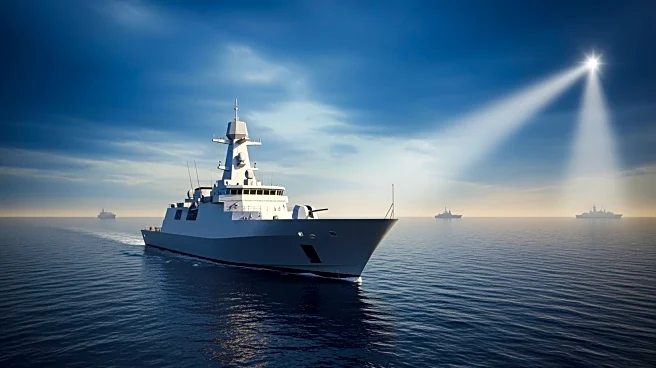What's Happening?
The European Union's diplomatic arm, the EEAS, is advocating for a maritime declaration that would empower EU nations to collaborate with flag states to conduct inspections on Russia's 'shadow fleet' of
oil tankers. This initiative is part of the EU's broader strategy to curb Russian oil and gas revenues, which are believed to be financing the Ukraine war. The proposal comes as EU foreign ministers prepare to discuss new measures against Russia. The Group of Seven industrialized economies has also agreed to target countries aiding Moscow in circumventing sanctions and those increasing Russian oil imports. The EEAS document highlights the need for bilateral agreements between flag states and the EU for pre-authorized inspections, addressing issues like fake flag registrations. The shadow fleet is estimated to consist of 600 to 1,400 vessels, with over 400 ships already sanctioned by Brussels. The upcoming 19th package of sanctions is expected to increase this number and advance a ban on Russian LNG imports.
Why It's Important?
The EU's move to inspect Russia's 'shadow fleet' is significant in the context of ongoing geopolitical tensions and the Ukraine conflict. By targeting Russian oil revenues, the EU aims to weaken Moscow's financial capacity to sustain its military operations. This initiative could impact global oil markets, potentially affecting prices and supply chains. Additionally, the proposal underscores the EU's commitment to enforcing sanctions and maintaining pressure on Russia. The involvement of the G7 indicates a coordinated international effort to address the issue, which could lead to broader diplomatic and economic consequences. Countries that have increased Russian oil imports or are helping Moscow evade sanctions may face scrutiny, affecting their trade relations and economic stability.
What's Next?
EU foreign ministers are set to meet to discuss the proposed maritime declaration and other measures against Russia. The adoption of the 19th package of sanctions is anticipated within the next week, which will likely increase the number of sanctioned vessels and bring forward the ban on Russian LNG imports. The EU's actions may prompt reactions from Russia, potentially escalating tensions further. Additionally, countries aiding Russia in circumventing sanctions may face diplomatic pressure or economic repercussions. The EU's focus on inspection rights and tackling fake flag registrations could lead to increased maritime security measures and cooperation with flag states.
Beyond the Headlines
The EU's proposal to inspect Russia's 'shadow fleet' highlights the complexities of enforcing international sanctions and the challenges of maritime security. The issue of fake flag registrations raises questions about the integrity of global shipping practices and the need for stricter regulations. The initiative also reflects the EU's strategic approach to weakening Russia's economic capabilities, which could have long-term implications for international relations and energy markets. The focus on Russian oil revenues underscores the interconnectedness of geopolitical conflicts and global economic systems.









